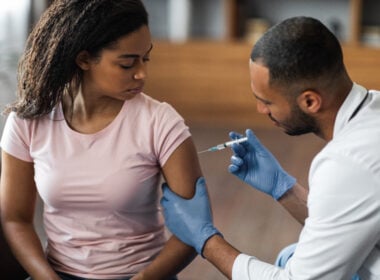It’s likely that you or someone you love has suffered from postpartum depression (PPD).
PPD affects 1 in 7 women, although the actual prevalence is probably higher. Current treatment options are not meeting the needs of women. Antidepressants, though life-saving for some, only work about half the time for the treatment of depression, they carry side effects, and they alter brain chemistry in a way that can make people more susceptible to depression relapse once the medication is discontinued. But a promising new treatment for PPD, Brexanolone, may offer hope for millions of suffering women by balancing out hormones. As a biomedical engineer and someone who has struggled with PPD in varying degrees after each of my 3 pregnancies, I can credibly say this is a game-changer for women’s health.
Many factors can contribute to the development of PPD—lack of support, genetic predisposition, diet, and more—but something that’s not often taken seriously enough is the incredible hormonal changes that a woman goes through during pregnancy, labor, delivery, and after birth.
What’s Going on in the Body
Beginning at implantation, the pregnancy hormone hCG rapidly begins to rise, doubling every couple of days in the early weeks. Starting around the 10th week of pregnancy, the placenta takes over estrogen and progesterone hormone production from the mom. By the 20th week of pregnancy, the woman’s estrogen levels are 200 times that of pre-pregnancy, and progesterone levels increase by a factor of 20 during pregnancy. After labor and delivery, estrogen and progesterone levels dramatically drop, the bonding hormone oxytocin rises (especially if the mother is breastfeeding), and hCG wanes.
Once the placenta is delivered, a woman’s body must re-establish its own production of estrogen and progesterone. When that process remains off balance, low hormone levels may contribute to the development of PPD. Some studies have found correlations between low progesterone postpartum and the severity of postpartum depression, although not all have seen this association. We do know that both progesterone and estrogen affect activity on the GABA receptors, often referred to as “feel good” receptors, in the brain. Without question, hormones do affect mood.
Starting back in the 1980s, Dr. Katherina Dalton recognized progesterone deficiency as a possible cause of PPD and had great success with bio-identical progesterone treatments in a combination of injections and suppositories. Her patients on average experienced only a 10 percent relapse, which is much lower than relapse rate with antidepressants. The side effects of progesterone treatment are generally short-lasting and mild, including spotting, dizziness, and loss of libido. It’s important to realize that bio-identical progesterone is NOT the same as the synthetic progestins found in birth control pills and so does NOT carry the same serious risks and side effects as hormonal contraception. Progestins have not been shown to have any benefits for treating PPD.
Based off of Dr. Dalton’s research, Natural Procreative Technology (NaProTechnology) has been using bio-identical progesterone injections for PPD treatment for years with great success. NaPro technology has a lot to offer women, including but not limited to: natural infertility treatments that work with a woman’s body, treatment for PCOS and endometriosis, and helping couples plan their family using the Creighton model of Natural Family Planning (NFP), also known as a Fertility Awareness-Based Method (FABM).
Although the progesterone treatment can be hit-or-miss, some women experience drastic mood improvement after just one injection. Others find relief after a couple doses. If you suspect you have PPD but don’t live near a NaPro doctor, contact the Pope Paul VI Institute, as they might be able to treat you remotely.
The Latest Developments for Treating PPD
Mainstream medicine has been taking note and is finally exploring hormonal treatment for PPD, using brexanolone (allopregnanolone), a nature metabolite of progesterone. Sage Therapeutics, located in Cambridge, Massachusetts, funded 3 clinical trials for brexanolone, resulting in two recent publications in Lancet (Lancet June 2017, and Lancet August 2018). Patients with PPD were randomized to receive a single 60-hour infusion of either brexanolone or a placebo. After treatment, the researchers reported that “administration of brexanolone injection for postpartum depression resulted in significant and clinically meaningful reductions” in depression scores, with “rapid onset of action.”
To say this could be a game-changer for many postpartum women is an understatement. One infusion of brexanolone or one progesterone injection is quite a different treatment model compared to antidepressants, which take weeks to kick in (if they help at all) and require daily medication for an undetermined amount of time. I anxiously await future research on Brexanolone.
Hormone levels are just one part of the whole picture. In addition to looking into bio-identical progesterone treatment, you might want to pursue other avenues with your healthcare provider:
- Check thyroid function with a full thyroid panel
- Get a referral for a therapist or counselor
- Check the status of vitamin D and iron levels
In closing, I’d like to encourage every reader to reach out to their postpartum loved ones. Postpartum depression isn’t always obvious to even a close friend or family member. For a new mom, it can be confusing to love her baby with every fiber of her being, while at the same time feeling inadequate, stressed, hopeless, and tired. Let her know she isn’t alone, and that there is help.
4 Ways Fertility Awareness Methods Can Improve Mental Health











